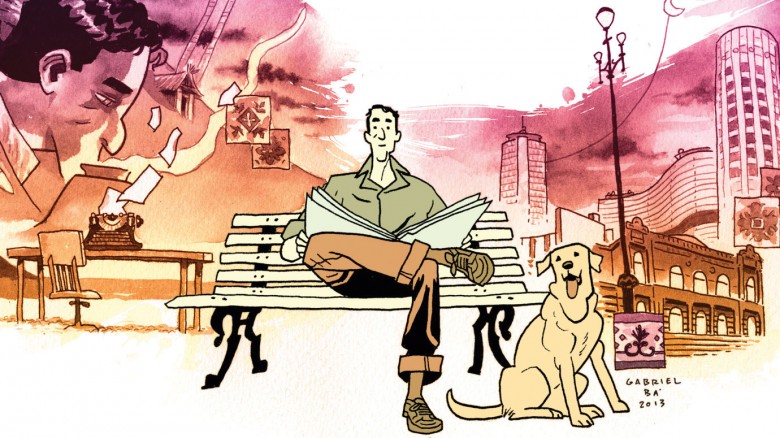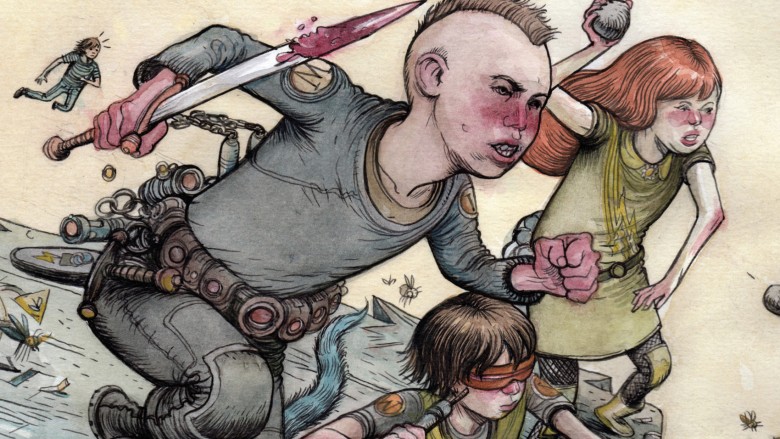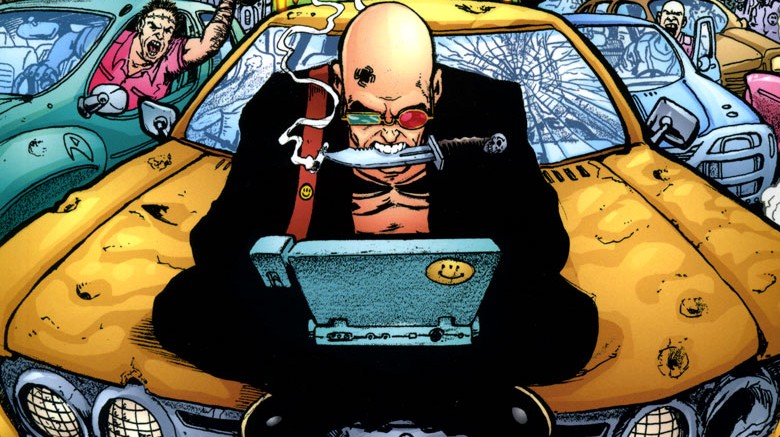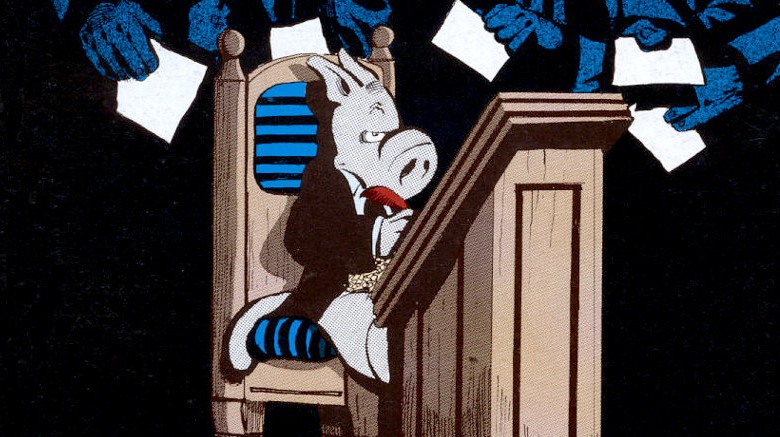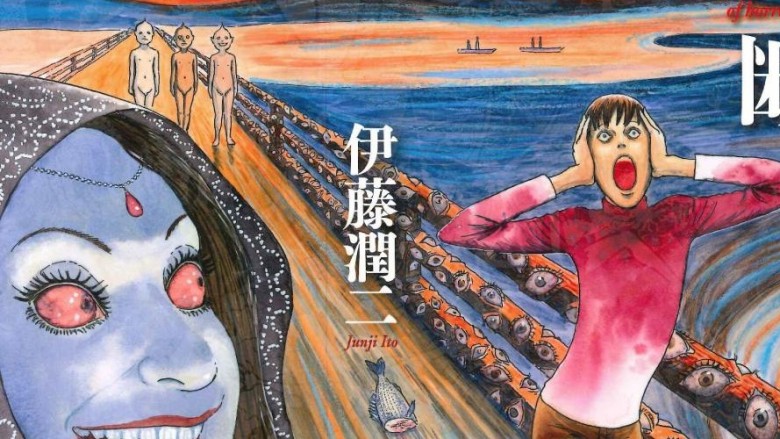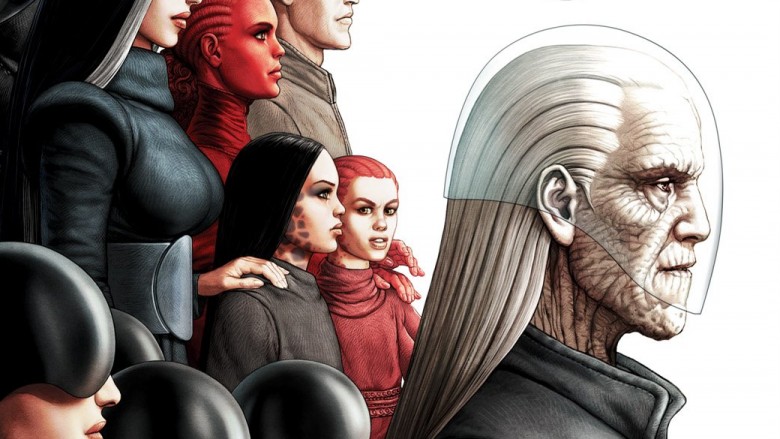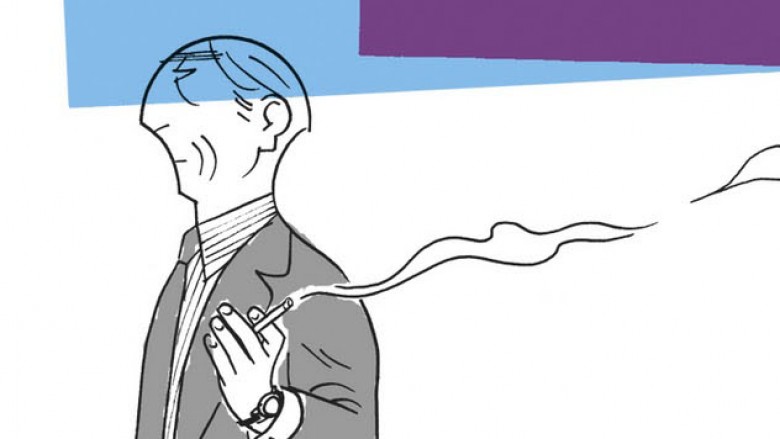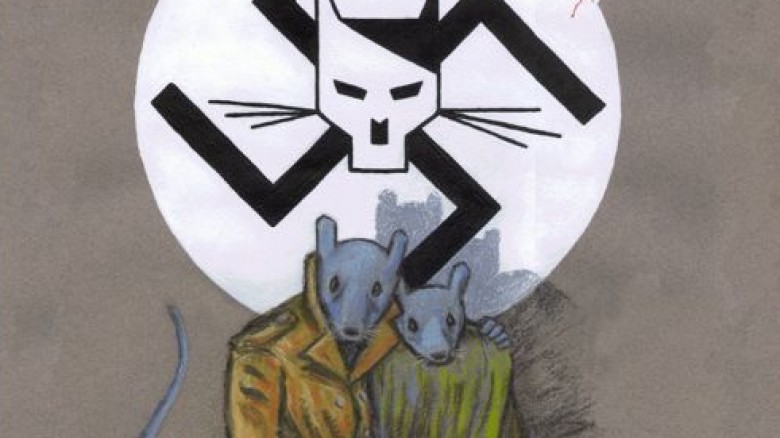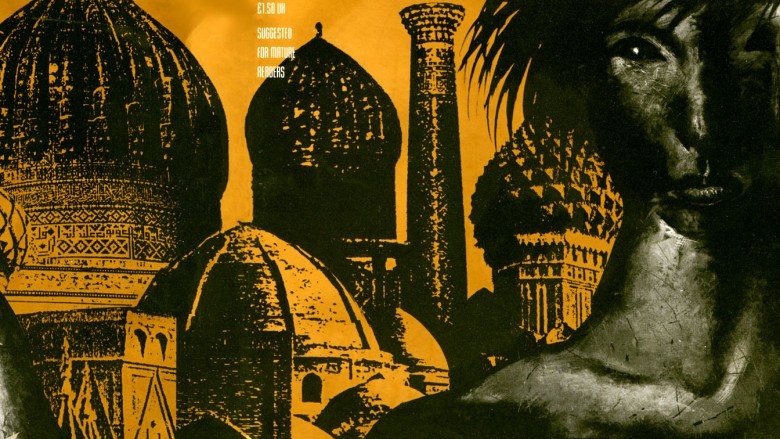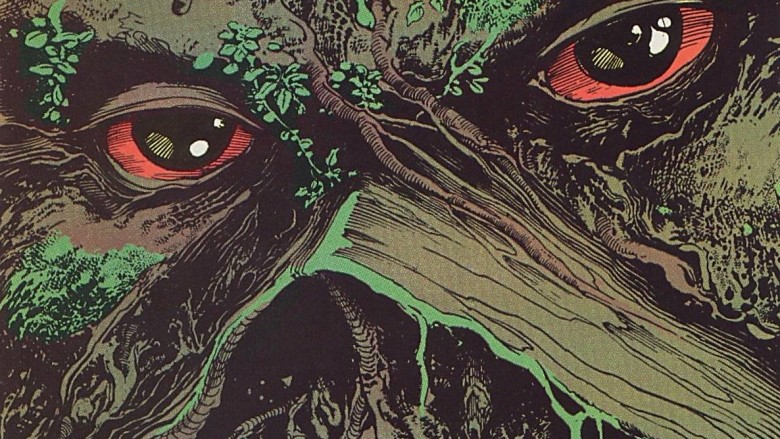Amazing Comics That Should Never Be Made Into Movies
These days, you can't toss a tub of popcorn at a movie screen without hitting some superhero saving the world. Comic book movies are in, and Hollywood is desperate to keep the gravy train rolling. If you're a minor Marvel character with an easy to digest backstory, chances are you're going to be getting your own franchise soon enough.
But, while capes and tights might make up most of your local megaplex's showings, there's still a whole world of comic book stories that Hollywood wouldn't touch with a ten-foot pole.
Whether because they're too complicated, too niche, or just plain too weird, comic books have never been better, but that doesn't mean they're all destined for Hollywood glory. Here are just a few great titles that you should read immediately, because you're never going to see them on the silver screen.
Daytripper
Understated meditations on death don't always burn up the box office, so it's no surprise that Brazilian twin brothers Fábio Moon and Gabriel Bá's acclaimed graphic novel Daytripper hasn't made the leap to the big screen. The book, which follows obituary writer Bras de Oliva Domingos as he tries to find some meaning in his life—by exploring all the ways it could end—was a revelation when it was released back in 2010, winning both an Eisner and Harvey Award.
What may, at first, seem like a gimmick, ending every issue with the death of our protagonist instead allows for Moon and Bá to reshape how we think about life. "Live each day like it's your last," takes on new resonance here, but it also creates a puzzle of a story that would be difficult to adapt. What first reads as a collection of shorts stories soon morphs into a larger whole, with an unorthodox rhythm that would struggle to fit the three-act structure of most films.
A television adaptation could be more faithful, but even that would be difficult, because in the end this comic explores how the small moments of our lives add up to a whole. On their own, these moments wouldn't make for great TV. It's as a collection that we see how the tapestry of Bras' life pieces together, forcing us to evaluate everything that came before. No, for this story to work, it needs to be kept simple, and on the page, where it began.
The Wrenchies
Farel Dalrymple's graphic novel defies description in many ways, which is, frankly, one of its best selling points. A post-apocalyptic The Warriors, with shades of The Matrix and The NeverEnding Story, this is what happens when a YA novel has a bad trip. Equal parts visual masterwork, literary allusion, and just good yarn, this is a book that was born to live on the comic book page. To try and make some sense of it on the big screen would just be to waste what makes it so special.
Its story is, at first blush, fairly simple. A group of kids form a gang to fight the evil "Shadowmen," and all the other wicked creatures of the oddly adult-less hellscape they inhabit. But, the further you read, the more it becomes a puzzle, with pieces that aren't designed to fit together.
Truthfully, it's Dalrymple's beautiful watercolors that tie the whole story together. While adapting this as a feature film would be any costume or set designers dream, losing the violently beautiful artwork of the graphic novel would immediately diminish it. This is a comic full of loose threads. You pull at one and the whole thing unravels. To adapt it would be to risk missing the point of why this is such a fun read. Better to leave it alone, than turn it into a hallow, YA novel version of Mad Max.
Transmetropolitan
Of all the ways to describe Transmetropolitan, Warren Ellis' drug fueled, cyberpunk satire, full of talking dogs and guns that make you crap your pants, "ahead of its time" might be the most surprising. And yet, this astute political satire was so prescient, it started tearing down Trump's America decades before the rest of us even saw it coming.
The story of Spider Jerusalem, a slimy reporter from the future, fighting for truth, justice, and a chance to keep the pricks at bay, many have tried to adapt this hard edged comic over the years, and many have failed. And even though, somehow, it feels like this is a moment when a movie or TV version could really make a difference, it's never going to happen.
Why, you say? Well, because movie studios like to make money, and this thing would cost a fortune, while alienating just about everyone who watched it. You like Trump. screw you, you're an idiot. Hillary? Same deal. You believe in just about anything, and you're a sucker. This is a hundred million dollar, Hard R movie with no explosions, Jedi, or common decency.
Patrick Stewart spent years trying to bring this to life, and if the thought of Captain Picard swearing, snorting, and screwing his way through a dystopian hellscape, while giving the rest of the world the middle finger, couldn't make it happen, nothing ever will.
Black Hole
While some of the comics on this list are too grand in scope, or outside the mainstream to ever be brought to the big screen, Black Hole's story is as grounded as you could get, considering the occasional character grows a mouth on their back. So what's the problem?
Charles Burns' critically acclaimed graphic novel tells the tale of a group of high school kids transforming into mutant freaks, thanks to a particularly virulent STD. It isn't a conventional horror story, with a clear-cut villain in a mask, threatening a group of squeaky-clean kids. No, here, there are no good and bad guys, just people with dark secrets, self loathing and an uncanny ability to manifest psychically everything they want to hide from the world.
What makes adapting it a challenge is blending the frank exploration of teenage sexuality, with the dark undercurrents of body and psychological horror. To do it justice would be to make a movie that had elements of Donnie Darko and Heathers, through the lens of David Cronenberg. And yes, that movie does sound amazing, which is why Brad Pitt and David Fincher have spent years trying to bring it to the screen. Neil Gaiman even wrote a script at one point, but when the studio saw that the project would require a fairly heft price tag for an R-rated art film, the whole thing fall apart.
There's also the issue of It Follows, an acclaimed horror movie with a somewhat similar premise, if a drastically different execution. While Black Hole is the original, and in many ways superior project, it would no doubt feel a bit like an "also ran" if it came out today.
Cerebus
Cerebus is about a talking aardvark, and if Howard the Duck taught us anything, it's that movies starring anthropomorphic animals can be a hard sell for adults. Written and drawn by Dave Sim, this title has been going strong since the 1970s, with no end in sight. Over the years the titular Cerebus has been a barbarian, a prime minister, and a Pope, exploring our political and social mores through the eyes of an aardvark.
With over 300 issues, divided into 16 drastically different storylines, the plots reach from swords and sorcery all the way to the last days of Oscar Wilde. It is as bizarre as it is massive. To do this story justice would be a herculean task that few outside of the obsessive Dave Sim would be up for. This is an idiosyncratic masterwork, full of its author's frustrating foibles and illuminating ideas. For anyone else to try their hand at it would be to obscure what makes this series worthwhile.
Alan Moore once said, "Cerebus, as if I need to say so, is still to comic books what Hydrogen is to the Periodic Table." And take it from the master, comics is where it belongs.
Prophet
When writer Brandon Graham joined the reboot of Image Comic's Prophet in 2012, he said his main goal was to "out 'Conan' the current run of 'Conan.'" This is pulp comics at its very best, and there's no way it would ever get adapted into a movie.
For one, this would be an unimaginably expensive movie to make. Forget world building, this sci-fi/fantasy epic "galaxy builds" better than anyone in comics, with the possible exception of SAGA. Comics can take you anywhere your imagination and ink set can dream up, but for a movie to replicate the alien worlds, bizarre creatures, and epic visuals this comic is famous for, you would need to break the bank. Considering this is still something of an underground comic, with a cult following at best, you can bet studios would be hesitant to pour money into it.
It's also one nutty book to read. Narrative simplicity is not the name of the game. Instead, writer Brandon Graham seems determined to make us feel like we've traveled ten thousand years in the future ourselves, and have no idea what the heck is going on. Frankly, any adaptation of this series would most resemble John Carter, only with a more gruesome, and surrealistic edge. Considering that movie bombed harder than a B-52, don't bet on Prophet getting reincarnated on the big screen any time soon.
Fragments of Horror
Manga comics are famous of their very specific genres, catering to very specific tastes, but there's still something heartwarmingly disturbing about the genre known as ero guro nansensu or "erotic grotesque nonsense." Take Fragments of Horror, Junji Ito's collection of short stories, that tell tales about folks willingly being dismembered, consumed by funghi and merging with inanimate objects.
"Please, please dissect me as fast as you can, senpai" a victim begs at one point, showing both the physical and the psychological horror at the heart of Ito's work. H.P Lovecraft is clearly a major influence, as the stories project a cultural uniformity that just barely masks the madness beneath.
So, what would an adaptation look like? To try and capture both the graphic violence and wild imagery, along with the more cerebral horrors, would be a massive undertaking, for a series that would appeal to a very specific audience. And, while these short stories may fit some sort of anthology adaptation, they are too unkempt and unusual to really fit a format that would do it justice. These aren't so much bite-sized narratives, as they are waking nightmares, and it would be hard to figure out a form that would do them justice.
Don't take our word for it. Ito himself describes the eight years he spent putting this book together with brutally dark honesty, "I feel like I wasted a whole lot of time."
The Technopriests
Alejandro Jodorowsky is probably best known these days for his failed attempt to bring Dune to the screen, all the way back in the 70s. His trials and tribulations with the project were even turned into the documentary Jodorowsky's Dune, which Variety called a "mind-blowing cult movie." Now, if you can get that kind of acclaim for a project you never saw to completion, it isn't any wonder that the man's finished projects can be quite extraordinary. The Technopriests was, in fact, Jodorowsky's chance to recycle many of the ideas he developed for Dune, and find a way to actually get them in front of an audience.
The comic tells the story of Albino, a man who leads some 50,000 disciples across the galaxy, running away from his cheese-making family, so he can become a Supreme Technopriest and video game creator. So, right away, you can probably see why this mind-bending comic might not be big screen material. It's weird, in the best possible way, but in one that probably precludes it from making much sense in any other form.
When you factor in that it's heavily influenced by Jodorowsky's own work on Dune, which was already rejected, you get the sense that the Universe just doesn't want this one to go any further.
Asterios Polyp
Asterios Polyp is a masterwork of the comic form and, frankly, one that could only work within it. David Mazzucchelli, the author and artist behind this comic, comes at it from an unusual angle. While many of the celebrated titles in comics today are the vision of a writer, and then interpreted by an artist, Mazzucchelli was an artist first and approaches his material with a distinctive eye. You can't separate the visuals from the narrative, leaving a piece of art that would somehow be less if anyone else tried to adapt it.
Its story is told through allegory and flashbacks, dreams, and even asides from the protagonist's stillborn twin brother. It draws heavily from Greek mythology, especially in the overly simplistic and symbolic approach to storytelling.
For this project to find life in a different medium, it would have to be rethought on a conceptual level. Would it be animated? Would it skip some of the more extreme stylistic choice in favor of narrative? Would it just be turned into some sort of art project, best shown in an art gallery, instead of a theater? There are projects that won't get made because they're too expensive, or lack a certain audience or appeal, but this movie won't get made because there just isn't a realistic way to make it.
Maus: A Survivor's Tale
Why would the first graphic novel to win the Pulitzer Prize, and one of the most acclaimed titles in the history of the medium, never be made into a movie? Well, let's be honest, this is a pretty tricky project to do justice to. Anything that tells the story of the Holocaust, but recasts the main players as cats and mice, would need to thread a very specific needle to live up to its source material, and not offend half the free world.
Artist and author Art Spiegelman famously used Hitler's own propaganda as a launching pad, transforming the Jewish people into the literal rodents that the Fuhrer implied them to be. It was a vivid way of twisting the Nazi's intent, to humanize a sect by literally stripping them of their humanity.
It isn't hard to picture a studio executive feeling a bit funny about risking his job for something so difficult to realize. You'd need to make an extremely brutal, graphic, and disturbing animated movie for adults. There's just no other way to do it. But Maus wouldn't be the first work of fiction substituting animals in for their human counterparts. Both Animal Farm and Watership Down have much celebrated, feature film adaptations. So, why can't it be adapted?
Well, the reason is actually quite simple, and emphatic. Spiegelman has forbid it. "I wouldn't like to see it," he told the Art Gallery of Ontario in an interview. "I've told my kids this as well, so that they'll remember after I'm just a GIF."
The Sandman
A feature film adaptation of The Sandman, Neil Gaiman's magnum opus about the God of Dreams, has been kicking around for decades. Most recently, Joseph Gordon Levitt stepped away from the project, on which he would have served as producer, director, and star, because of the dreaded "creative differences." And, while we don't know exactly what those differences were, it isn't hard to imagine why they happened.
Frankly, The Sandman is a comic that lends itself to an endless number of interpretations, no two exactly the same. Over the course of 20 years, and 75 issues, Morpheus, the Prince of Stories, has somehow moved in and out of reality, finding love and seizing the reigns of Hell, attending serial killer conventions and flirting with cat ladies, losing his mind and his life, and then regaining then both again. There's just no easy way to describe The Sandman, because The Sandman isn't one thing. Instead, it's an amalgamation of all the stories mankind has ever told, as if remembered from a dream.
Look, everyone from Logan helmer James Mangold to Superman producer Jon Peters have taken their turn with the project, only to find themselves hitting a brick wall. Illusive, with an ethereal storytelling style and a thoroughly unlikeable protagonist, this is a comic that just doesn't lend itself to the simple blockbuster script that Hollywood loves. No, to do this story justice, you would need to make a five-hundred-million dollar art film, which just isn't what the studio system is set up to do. So, unless Terry Gilliam wins the Powerball, this one will have to remain page bound, where it's always belonged.
Alan Moore's Swamp Thing
Alan Moore's run writing Swamp Thing is the stuff of legend. Taking place in the DC universe, but far away from the capes and tights of its traditional superheroes, Moore took a hokey villain and transformed him into a existential look at life itself. So, how do you go about making that into a movie? It's easy to adapt some goofy comic with a cool concept, but how do you adapt a real work of genius? How do you bring together the campy action, philosophical probing, and high drama that Moore managed to blend seamlessly, and wrap it all around a walking, talking vegetable?
Sadly, another of Moore's titles, The Watchmen, perfectly illustrates why adapting his vision would be so difficult. The 2009 superhero flick, helmed by Zach Synder, saw the filmmaker take the general construct and concept of the source material, and completely miss the depth underneath. Just ask the iconic author, who said of the movie, "...I will also be spitting venom all over it..."
With Swamp Thing, which stars a Jolly Green Giant of sorts, who battles his desire to reject humanity and rejoin his fellow flora and fauna, the land mines are even more clear. It's easy to picture a director like Snyder making it into a rip roaring action movie, and ignoring all that made it special. That may be why no one, excepting a Wes Craven movie unrelated to Moore's run on the comic, has even had to guts to even try.

